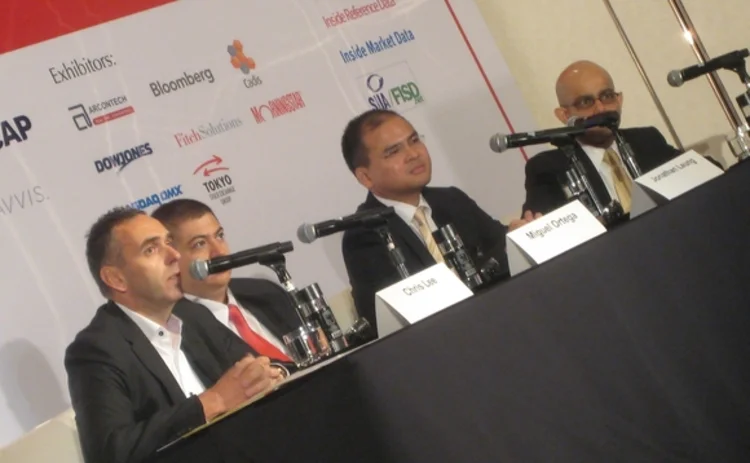Asia-Pacific Financial Information Conference Panel: Asia Co-Location Centers Must Open Up

Panelists at last week’s conference called for ways to make co-location more accessible to make cross-market trading more practical in the region.
Exchanges are too restrictive over who can access the centers, and do not provide sufficient latency transparency to allow firms to tune their trading algorithms, said Del Abdullah, head of electronic trading technology at Daiwa Securities.
Demand for connections between venues in Japan is growing, “but if you are in the Tokyo Stock Exchange’s co-lo center, you can’t connect to other venues, even if they are in the same building—and that hinders business, because you can’t perform best execution or take advantage of different tick sizes on different exchanges,” said Miguel Ortega, market data engineer at Deutsche Securities Japan, who added that regulation may be required to force datacenter operators to open themselves to competing venues in the interests of best execution and good business.
“Exchanges being in a public datacenter where they could cross-connect would make more economic sense,” said Chris Lee, global head of direct access and electronic brokerage at ABN Amro Clearing, who moderated the panel. “But I don’t think regulation will drive exchanges into co-locations—though maybe exchange mergers would, or maybe if an exchange finds itself with empty racks in a big co-lo center that it invested a lot of money in.”
However, Jonathan Leung, vice president of market development and head of hosting services at Hong Kong Exchanges and Clearing, said HKEx’s policy for its own co-lo center will be more relaxed than other restrictive exchange agreements, and that in future, exchange datacenters will be required to provide more value to clients.
“From a technical standpoint, the point at which the speed of light becomes the limitation will probably be what creates a more level playing field,” Ortega said. “So then it comes down to who has better strategies and who makes best use of market conditions, rather than it just being a latency arms race.”
Only users who have a paid subscription or are part of a corporate subscription are able to print or copy content.
To access these options, along with all other subscription benefits, please contact info@waterstechnology.com or view our subscription options here: https://subscriptions.waterstechnology.com/subscribe
You are currently unable to print this content. Please contact info@waterstechnology.com to find out more.
You are currently unable to copy this content. Please contact info@waterstechnology.com to find out more.
Copyright Infopro Digital Limited. All rights reserved.
As outlined in our terms and conditions, https://www.infopro-digital.com/terms-and-conditions/subscriptions/ (point 2.4), printing is limited to a single copy.
If you would like to purchase additional rights please email info@waterstechnology.com
Copyright Infopro Digital Limited. All rights reserved.
You may share this content using our article tools. As outlined in our terms and conditions, https://www.infopro-digital.com/terms-and-conditions/subscriptions/ (clause 2.4), an Authorised User may only make one copy of the materials for their own personal use. You must also comply with the restrictions in clause 2.5.
If you would like to purchase additional rights please email info@waterstechnology.com
More on Emerging Technologies
2026 will be the year agent armies awaken
Waters Wrap: Several AI experts have recently said that the next 12 months will see significant progress for agentic AI. Are capital markets firms ready for this shift from generative AI to agents?
Editor’s Picks: Our best from 2025
Anthony Malakian picks out 10 stories from the past 12 months that set the stage for the new year.
The next phase of AI in capital markets: from generative to agentic
A look at some of the more interesting projects involving advanced forms of AI from the past year.
Market data costs defy cyclicality
Trading firms continue to grapple with escalating market data costs. Can innovative solutions and strategic approaches bring relief?
As trading firms embrace AI, so do hackers
According to a Google cybersecurity report, cybercriminals are turning to AI to sharpen their attacks.
AI & data enablement: A looming reality or pipe dream?
Waters Wrap: The promise of AI and agents is massive, and real-world success stories are trickling out. But Anthony notes that firms still need to be hyper-focused on getting the data foundation correct before adding layers.
Waters Wavelength Ep. 343: Broadridge’s Jason Birmingham
This week, Jason Birmingham of Broadridge talks with Tony about the importance of fundamentals as technology rapidly evolves.
Data standardization is the ‘trust accelerator’ for broader AI adoption
In this guest column, data product managers at Fitch Solutions explain AI’s impact on credit and investment risk management.








